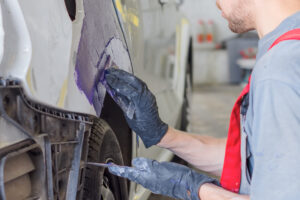
I-CAR shares guide to teaching entry-level technicians
By onBusiness Practices | Collision Repair | Education
A newly-published I-CAR guide aims to teach collision repair operators how to more effectively onboard entry-level technicians through both in-house mentoring and I-CAR courses.
The five-page manual is part of I-CAR’s wider initiative to help the industry attract, mentor, train and retain technicians.
Dara Goroff, I-CAR’s planning and industry talent programming vice president, said the guide is meant to help teach those with no experience the basics of repairs, before empowering them to put that knowledge into action under the watchful eyes of a mentor.
She said the guide was developed to help shops recruit and train new talent amid a national skilled worker shortage.
“With feedback from the industry on the prevailing talent crisis, we know that right now shops are hurting for talent but sometimes have to turn away interested but inexperienced technicians because shops don’t always have a way to get them up to speed,” Goroff told Repairer Driven News.
“I-CAR published the Entry-Level Learning and Development Guide, which includes course bundles and a mentorship/entry-level technician relationship guide, in September of 2022 to support entry-level technicians and shops immediately as we built out the full scope of our talent programming initiative. The guide is a bridge that will connect today’s industry curriculum to I-CAR’s upcoming comprehensive solution for attracting, mentoring, training and retaining technicians.”
I-CAR said its courses, taught by industry veterans, take a “progressive and methodical approach” to tasks, beginning with simple jobs and gradually growing in complexity.
Before repairers begin taking cues from the guide, they should first set expectations and clear goals for their new hires, I-CAR said. It added that mentors should help entry-level techs understand how they’re being evaluated, while taking note of their skill gaps, strengths and weaknesses.
“Compatibility between mentor and entry-level technician is a major key to success so mentors need to be carefully selected, be properly trained, and have strong organizational support in their new role,” the guide says.
The guide distinguishes new employees by two paths. The first, “discovery,” is meant for training basic disassembly and damage analysis. In this category, tasks range from dumping trash and moving cars to removing a bumper or install body sheet metal.
The second group, called “fast lane” is for those being trained on minor damage repair. New hires might be asked to align difficult aftermarket parts, repair minor non-cosmetic items, or replace the cooling components and bleed system.
Mentoring relationship
The relationship between a mentor and entry-level tech can vary based on the shop setup and the number of mentors available to work with the rookie repairer, the guide said.
It could also differ based on a mentor’s skill set, workload and availability, but the guide assumes that the relationship between the trainee and trainer will take a certain approach.
First, the mentor should demonstrate how to complete a task before giving the new technician a change to try it themselves with help. From there, the mentor will play a supervisory role in the assigned work, but doesn’t step in to help unless necessary.
Gradually, the entry-level will reach a point where they’re trusted to perform tasks unsupervised, with mentors nearby to perform quality checks and ensure the proper procedures were followed.
Once the mentor is confident in the entry-level technician’s abilities, he or she signs off that they are proficient in the skill.
“One of the bigger challenges shop leaders face is that they don’t have the time to create a meaningful onboarding process for those new to the industry, so when an eager but inexperienced technician shows up at the shop, they’re either turned away or they’re given less impactful things to do,” Goroff said “In turn, the new employee isn’t learning the trade which means they’re not given the opportunity to find meaning and satisfaction in the role. Even if a shop manager or trainer has the time to onboard their new employee, they may not be familiar with all of the different adult learning styles and may only be comfortable in teaching the way they themselves learn which could cause a new employee to disengage.
“The Entry-Level Learning and Development guide helps shop managers, shop mentors and entry-level technicians balance teaching and learning while doing actual hands-on work with a repeatable plan to follow. It gives all groups access to a guide that outlines key milestones and deliverables through the new-to-the-industry technician’s journey. A structured plan helps the new employee to be invested in, and the shop manager benefits by having an employee who is brought up to speed and productive more quickly and happily. ”
The guide is available to download at I-CAR.com/entry-level.
Images
Featured image credit: art159/iStock
